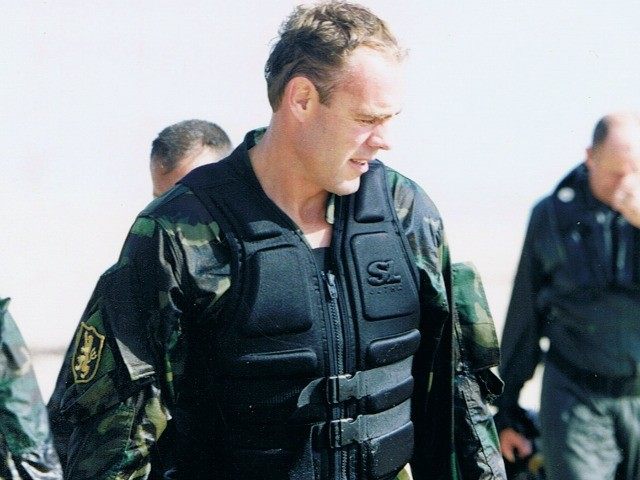This past weekend, Congressman Ryan Zinke (R-MT) joined Breitbart Editor-in-Chief Alex Marlow for a special Memorial Day edition of Breitbart News Radio. Zinke shared with the listening audience his insights into the fall of the city of Ramadi, Iraq, to the Islamic State (ISIS/ISIL) and the release of information about documents from the Navy SEAL Team Six Osama bin Laden raid.
Marlow informed listeners that Zinke previously led SEAL Team Six, asking for a thirty thousand-foot view of his perspective on the release of documents and information from the bin Laden raid.
Zinke said most of his career in the military was spent in planning, preparing, and the occasional conflict, while many service members today face more combat, entering the service while in war. He then reflected on the effect of social media that facilitates the quick spread of news.
Zinke said:
Within hours after SEAL Team Six conducted the bin Laden Raid, it was reported that SEAL Team Six conducted the hit, and in my experience of SEAL Team Six, you didn’t utter the words that we even existed. Yet now, you have the administration confirming that SEAL Team Six conducted the battle.
Regarding the release of documents, Zinke said when documents are released, the U.S. government confirms what he have.
“Sometimes. keeping the enemy guessing is a better longterm strategy,” he said.
Marlow asked Zinke what advantage there could be to leaking these documents.
“I don’t see any tactical or strategic advantage of releasing documents,” Zinke replied.
Marlow referenced Zinke’s prior position as a leader for SEAL Team Six and his involvement in successfully defending Ramadi, Iraq. ISIS overtook Ramadi Sunday, May 17. Marlow asked the former SEAL Team leader for his reaction to seeing Ramadi fall to ISIS and what type of leadership America is currently exhibiting.
Specifying his position as deputy acting commander of Special Forces in Iraq, Zinke described knowing the Anbar province well. He further elaborated that he was deployed to Fallujah when the city became a hot point of conflict. Zinke described Ramadi as key and central to the region.
In the past week, as Ramadi fell to ISIS, the Obama administration dismissed the fall of Ramadi as inconsequential. White House Press Secretary Josh Earnest said, “Are we going to light our hair on fire every time that there is a setback in the campaign against ISIL?”
Zinke pointed to Iran as a serious threat: “Iran now has an enormous amount of influence in direct coordination with centralized government in eastern Iraq.”
“The end result is you have a divided Iraq,“ he said. “Iraq has devolved under this administration to the point that I’m not sure that Iraq can sustain itself as a unified nation.”
Responding to Marlow’s question of what would happen if Iraq did devolve further, Zinke said:
Much [of] what we’re seeing. You have a Sunni, primarily the Anbar province and perhaps Mosul, becoming the Shia area. You have the eastern side of Iraq all the way down to Basra as a heavily Iranian influenced Iraq and the north Kurd area. You know they’ve challenged the Kurd state as Mosul would attack is [sic] you could have up to 700,000 refugees. Turkey has had about 2 million refugees, and there’s some problems in Turkey with refugees competing for jobs. The economy in Turkey isn’t great. So there’s tension not only in southern Turkey, but across Turkey itself to include the capitol–and Kurds, which oddly enough now, is a sanctuary for the Christians. Given that backdrop again, it has been an absolute nightmare for our foreign policy.
Zinke continued:
Unless Congress actively steps in and stops this administration from continuing to negotiate a legal pathway for Iran to have a nuclear weapon, what the next president is going to face is a nuclear-capable Iran, a nuclear-capable Saudi Arabia, likely Turkey, possibility of Jordan, the UAE (United Arab Emirates)–so a Middle East that’s been notoriously unstable, having several countries with a nuclear weapon.
He then pointed out this also could lead to Islamic terrorist groups gaining access to nuclear weapons–groups that tweet and seek to carry out the destruction of America, he noted, “In the case of Iran, the Persians haven’t won a war in centuries, but they haven’t lost a negotiation, either.”
Zinke described the deal the Obama administration wanted Congress to approve would have left Iran with 6,500 centrifuges and the right to enrich uranium and no impromptu inspections. He said the deal would have given Iran a ten-year path and then a legal pathway to a nuclear weapon. “In turn,” he said, “we would give them 50 billion dollars.” He added, “To me, that’s insanity.”
Al-Qaeda’s mission is no different than Hezbollah’s, Zinke stated. “In many ways, their mission is no different than the Ayatollah regime–is the destruction of the West.”
Zinke suggested many other options that are better than a bad deal with Iran, including a blockade, sanctions, and military strikes.
Reflecting on his decision-making process when voting in Congress, Zinke said, “Every vote I cast, I think about how it affects our veterans, and how it affects Montana, and how it affects American values.”
Congressman Ryan Zinke is a 23-year U.S. Navy SEAL veteran, former leader of SEAL Team Six, and two-time recipient of the Bronze Star for combat.
Follow Michelle Moons on Twitter @MichelleDiana.

COMMENTS
Please let us know if you're having issues with commenting.